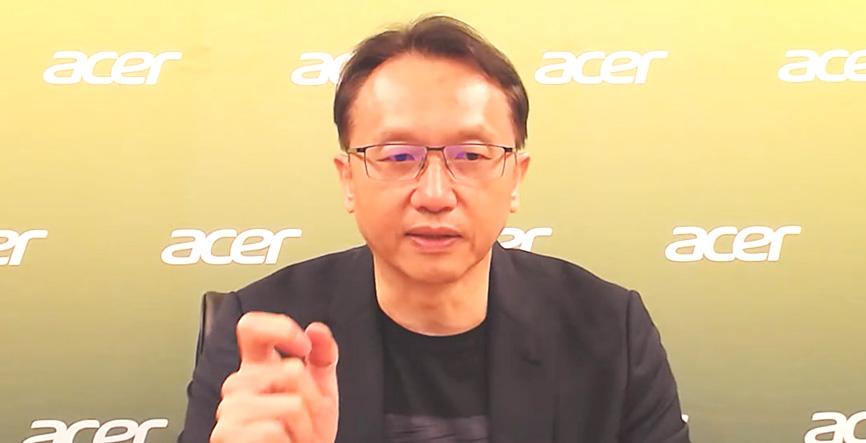Acer Inc (宏碁) chief executive officer Jason Chen (陳俊聖) and other senior executives at the firm last month continued to purchase company shares to show confidence in the PC vendor, Acer’s filings with the Taiwan Stock Exchange showed.
The move came as the company’s PC shipments in the second quarter increased 17.6 percent year-on-year, the largest growth among the world’s top five PC vendors, data released by the company and International Data Corp (IDC) showed last week.
Revenue last quarter increased 21.7 percent year-on-year to NT$79.78 billion (US$2.85 billion), the highest for the period in 10 years, the data showed.

Photo: CNA
Acer has over the past few years developed a corporate culture that encourages ranking officials to buy company shares to express confidence in its products.
Acer founder Stan Shih (施振榮) in 2016 said that ownership in the company would make executives feel responsible for the firm’s long-term development instead of operating the company with a short-term view.
The exchange filing showed that Chen and 10 other executives last month purchased a total of 1.067 million Acer shares at an average price of NT$31.31 per share, spending about NT$33.38 million.
Chen bought 150,000 shares, in addition to 750,000 shares he bought earlier this year, it showed.
Acer shares closed up 0.72 percentage points at NT$27.9 in Taipei trading on Friday.
Shares have gained 17.97 percent so far this year, compared with a 21.47 percent increase in the TAIEX.
Diversification efforts over the past few years have borne fruit for Acer, with stable sales and earnings contributions from investments, while its new products, including 5G laptops, Chromebooks, Predator gaming PCs and products of the ConceptD content creator series, also help it compete with other major brands.
In the second quarter, Acer shipped 6.09 million units worldwide, boosting its market share to 7.3 percent, and helping it become the world’s fifth-largest supplier, IDC said in a report on Monday last week.
Global PC shipments — including desktops, laptops and workstations — reached 83.6 million units, up 13.2 percent from a year earlier, despite global component shortages and logistics issues, the report said.

SEMICONDUCTORS: The German laser and plasma generator company will expand its local services as its specialized offerings support Taiwan’s semiconductor industries Trumpf SE + Co KG, a global leader in supplying laser technology and plasma generators used in chip production, is expanding its investments in Taiwan in an effort to deeply integrate into the global semiconductor supply chain in the pursuit of growth. The company, headquartered in Ditzingen, Germany, has invested significantly in a newly inaugurated regional technical center for plasma generators in Taoyuan, its latest expansion in Taiwan after being engaged in various industries for more than 25 years. The center, the first of its kind Trumpf built outside Germany, aims to serve customers from Taiwan, Japan, Southeast Asia and South Korea,

Gasoline and diesel prices at domestic fuel stations are to fall NT$0.2 per liter this week, down for a second consecutive week, CPC Corp, Taiwan (台灣中油) and Formosa Petrochemical Corp (台塑石化) announced yesterday. Effective today, gasoline prices at CPC and Formosa stations are to drop to NT$26.4, NT$27.9 and NT$29.9 per liter for 92, 95 and 98-octane unleaded gasoline respectively, the companies said in separate statements. The price of premium diesel is to fall to NT$24.8 per liter at CPC stations and NT$24.6 at Formosa pumps, they said. The price adjustments came even as international crude oil prices rose last week, as traders

Taiwan Semiconductor Manufacturing Co (TSMC, 台積電), which supplies advanced chips to Nvidia Corp and Apple Inc, yesterday reported NT$1.046 trillion (US$33.1 billion) in revenue for last quarter, driven by constantly strong demand for artificial intelligence (AI) chips, falling in the upper end of its forecast. Based on TSMC’s financial guidance, revenue would expand about 22 percent sequentially to the range from US$32.2 billion to US$33.4 billion during the final quarter of 2024, it told investors in October last year. Last year in total, revenue jumped 31.61 percent to NT$3.81 trillion, compared with NT$2.89 trillion generated in the year before, according to

SIZE MATTERS: TSMC started phasing out 8-inch wafer production last year, while Samsung is more aggressively retiring 8-inch capacity, TrendForce said Chipmakers are expected to raise prices of 8-inch wafers by up to 20 percent this year on concern over supply constraints as major contract chipmakers Taiwan Semiconductor Manufacturing Co (TSMC, 台積電) and Samsung Electronics Co gradually retire less advanced wafer capacity, TrendForce Corp (集邦科技) said yesterday. It is the first significant across-the-board price hike since a global semiconductor correction in 2023, the Taipei-based market researcher said in a report. Global 8-inch wafer capacity slid 0.3 percent year-on-year last year, although 8-inch wafer prices still hovered at relatively stable levels throughout the year, TrendForce said. The downward trend is expected to continue this year,